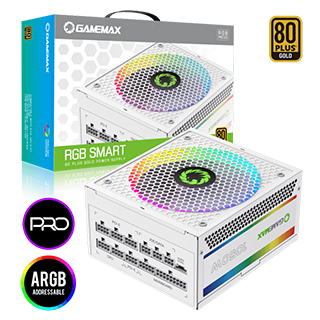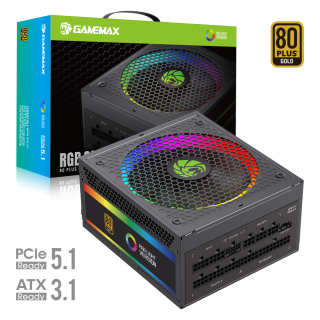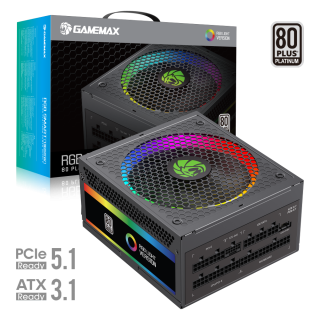When building a gaming computer, the power supply unit (PSU) often takes a backseat to components like the graphics card or processor. However, the PSU is the backbone of your system, ensuring stable and reliable power delivery to all your components. A poorly chosen power supply can lead to system instability, reduced component lifespan, or even hardware failure. Here’s everything you need to know about selecting the perfect PSU for your gaming rig.

Gaming computers demand high performance, especially under heavy loads. Modern GPUs and CPUs can consume significant power, especially during resource-intensive tasks like AAA gaming or video rendering. A high-quality PSU ensures:
Stable Performance: Provides consistent voltage to prevent crashes or sudden reboots.
Longevity: Protects your components from power fluctuations.
Scalability: Supports future upgrades without requiring a new PSU.

Power Supply RGB-750 PRO Fully Modular 80+ Gold Certified with RGB Light Mode ARGB SYNC.
• 750W Power: Fully modular, 80+ Gold Certified, 90% efficiency
• Advanced Design: LLC+DC-DC with powerful single +12V rail.
• Compatibility: Supports ATX 3.1, PCIe 5.1, 16-pin 12V-2*6 for latest GPUs.
• RGB Lighting: 140mm ARGB fan with 25 lighting modes, syncs with major motherboard brands.
• High-Quality Components: Japanese bulk capacitor for durability and stability.
• Quiet Cooling: 140mm ultra-quiet fan with automatic temperature control.
• Wireless Design: Wireless design for cleaner setup and better heat dissipation.
• Comprehensive Protection: OPP/OVP/UVP/SCP/OCP/SIP for stability and safety.

GameMax RGB 850w power supply,80+ Gold Efficiency,modular power supply
• 850W Power: Fully modular, 80+ Gold Certified, 90% efficiency
• Advanced Design: LLC+DC-DC with powerful single +12V rail.
• Compatibility: Supports ATX 3.0/3.1, PCIe 5.0/5.1, 16-pin 12V-2*6 for latest GPUs.
• RGB Lighting: 140mm ARGB fan with 25 lighting modes, syncs with major motherboard brands.
• High-Quality Components: Japanese bulk capacitor for durability and stability.
• Quiet Cooling: 140mm ultra-quiet fan with automatic temperature control.
• Wireless Design: Wireless design for cleaner setup and better heat dissipation.
• Comprehensive Protection: OPP/OVP/UVP/SCP/OCP/SIP for stability and safety.

PC Power Supply 1050w Fully Modular 80+ Gold Certified with RGB Light Mode ARGB SYNC
• 1050W Power: Fully modular, 80+ Gold Certified, 90% efficiency
• Advanced Design: LLC+DC-DC with powerful single +12V rail.
• Compatibility: Supports ATX 3.0/3.1, PCIe 5.0/5.1, 16-pin 12V-2*6 for latest GPUs.
• RGB Lighting: 140mm ARGB fan with 25 lighting modes, syncs with major motherboard brands.
• High-Quality Components: Japanese bulk capacitor for durability and stability.
• Quiet Cooling: 140mm ultra-quiet fan with automatic temperature control.
• Wireless Design: Wireless design for cleaner setup and better heat dissipation.
• Comprehensive Protection: OPP/OVP/UVP/SCP/OCP/SIP for stability and safety.

GameMax RGB 1300w PC power supply, 80 Platinum Certified,modular power supply
• 1300W Power: Fully modular, 80+ Platinum Certified, 92% efficiency
• Advanced Design: LLC+DC-DC with powerful single +12V rail.
• Compatibility: Supports ATX 3.0/3.1, PCIe 5.0/5.1, 16-pin 12V-2*6 for latest GPUs.
• RGB Lighting: 140mm ARGB fan with 25 lighting modes, syncs with major motherboard brands.
• High-Quality Components: Japanese bulk capacitor for durability and stability.
• Quiet Cooling: 140mm ultra-quiet fan with automatic temperature control.
• Wireless Design: Wireless design for cleaner setup and better heat dissipation.
• Comprehensive Protection: OPP/OVP/UVP/SCP/OCP/SIP for stability and safety.
The PSU wattage determines how much power it can provide. To calculate the wattage your system requires:
Add up the power consumption of all components (CPU, GPU, storage, etc.).
Factor in future upgrades.
Add a 20-30% buffer for optimal performance.
For example, a typical mid-range gaming PC with a modern GPU like the RTX 4060 and a Ryzen 5 processor might need around 550W, while a high-end build with an RTX 4080 and Intel i9 might require 750-850W.
PSUs come with efficiency ratings, often certified under the 80 PLUS program. Higher efficiency means less power wasted as heat, lower electricity bills, and a cooler system. Common ratings include:
80 PLUS Bronze: Entry-level efficiency.
80 PLUS Gold: Balanced performance and efficiency for gaming builds.
80 PLUS Platinum/Titanium: Premium efficiency for high-end rigs.
Non-Modular: Fixed cables, lower cost, but can result in cluttered cables.
Semi-Modular: Essential cables are fixed; others are detachable.
Fully Modular: All cables are detachable for maximum customization and tidiness.
For gaming PCs with a transparent case or ARGB setup, a modular PSU improves cable management and aesthetics.
Stick with reputable PSU brands like Corsair, Seasonic, or EVGA, known for durability and safety features like over-voltage protection, under-voltage protection, and short-circuit protection.
Ensure the PSU has enough connectors for your system:
PCI-E cables for GPUs.
SATA connectors for SSDs/HDDs.
CPU power cables for high-performance processors.
If you plan to overclock your CPU or GPU, choose a PSU with higher wattage to handle the increased power draw.
Many gaming builds include RGB lighting and fans. Opt for PSUs with ARGB compatibility or a clean design that complements the system's look.
Look for PSUs with zero-RPM modes, where the fan only operates under heavy load, ensuring quieter operation during regular use.
The power supply is the unsung hero of a gaming computer, providing the foundation for stable and efficient operation. Investing in a high-quality PSU not only protects your components but also enhances your overall gaming experience. When building or upgrading your rig, take the time to calculate your power needs and select a PSU that matches both your current setup and future aspirations.
A reliable PSU ensures that your gaming adventures are uninterrupted, whether you're raiding dungeons or battling on the e-sports stage.